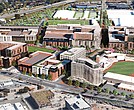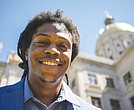Senator questions cuts in schools’ maintenance funds
Jeremy M. Lazarus | 7/8/2018, 12:36 p.m.
The leader of a state Senate subcommittee that is taking a look at school building needs across Virginia wants to know whether Richmond’s decision to shrink spending on routine school maintenance by millions of dollars violates a U.S. Supreme Court decision and the state Constitution.
Republican state Sen. William M. Stanley of Franklin asked that question in a letter he sent Monday to Mayor Levar Stoney, adding fresh impetus to the policy debate over the city’s investment in aging and increasingly decrepit public school buildings.
Mayor Stoney so far has remained mum about a citizen-initiated, legislature-approved change to the City Charter that went into effect July 1. That change requires him by Jan. 1 to come up with a fully funded plan to improve or replace all of the city’s decaying school buildings or say why he cannot do so without raising taxes.
In a return letter Tuesday to Sen. Stanley, the mayor wrote that both the Supreme Court decision and the state Constitution “speak to the responsibilities of the Commonwealth, not the locality. … Yet despite the requirements of the Constitution state funding has decreased.
“It should be no surprise to you or your colleagues that, as more of our local dollars have been required to fill the gap left us by the Commonwealth, critical items like maintenance have been deferred,” the mayor continued in pointing the finger of blame at the state’s budget policies that he stated “are short-changing our students.”
In his letter, Sen. Stanley cited Free Press and other newspaper reports about the mayor and council’s decision to reduce spending on routine maintenance from about $9.1 million in the budget year that ended June 30 to $1.6 million in the new budget year that began July 1, an 82 percent cut amounting to $7.5 million in eliminated funds.
Sen. Stanley asked the mayor to respond to this question: “Do you believe failing to provide the funding necessary to do basic maintenance to avoid conditions the school superintendent (Jason Kamras) called ‘heartbreaking’ is consistent with the Brown II decision and Article VIII Section I of the Virginia Constitution?”
Brown II refers to a 1955 Supreme Court decision that followed up on the famed 1954 Brown v. Board of Education decision that overturned as unconstitutional state laws requiring public schools to be segregated by race. Brown II listed the keeping of school facilities in good condition for all students as one element that local governments had to address to eliminate segregated conditions.
The state constitutional provision Sen. Stanley cited directs the General Assembly to provide a free system of public schools and to “seek to ensure that an educational program of high quality is established and continually maintained.”
Sen. Stanley wrote that Mayor Stoney’s response to the question “will help me develop facility legislation for the 2019 General Assembly session.” He has yet to respond to Mayor Stoney’s answer.
The exchange of letters took place almost at the same time Davenport & Co., the city’s investment adviser, issued an updated report on the impending city investment in schools.
That report recommended that the only investment that the city should make in schools through 2023 should be the $150 million that would come from the 1.5 percent increase in the sales tax on restaurant and prepared meals that went into effect Sunday.
The extra tax, aimed at raising $9 million a year to repay that $150 million over 20 years, increased the city’s share of the sale tax from 6 percent to 7.5 percent and raised the total sales tax in Richmond on prepared food to 12.8 percent.
However, the School Board and City Hall are only planning to spend about $110 million of that new money, or at least $40 million less. The $110 million is to be used to build two new elementary schools, Greene and George Mason, to replace their old buildings, and a new Elkhardt-Thompson Middle School. The rush is on to get them open by 2020 when the mayor is expected to be seeking re-election along with members of the council and the School Board.
The rest of the money remains unallocated.







